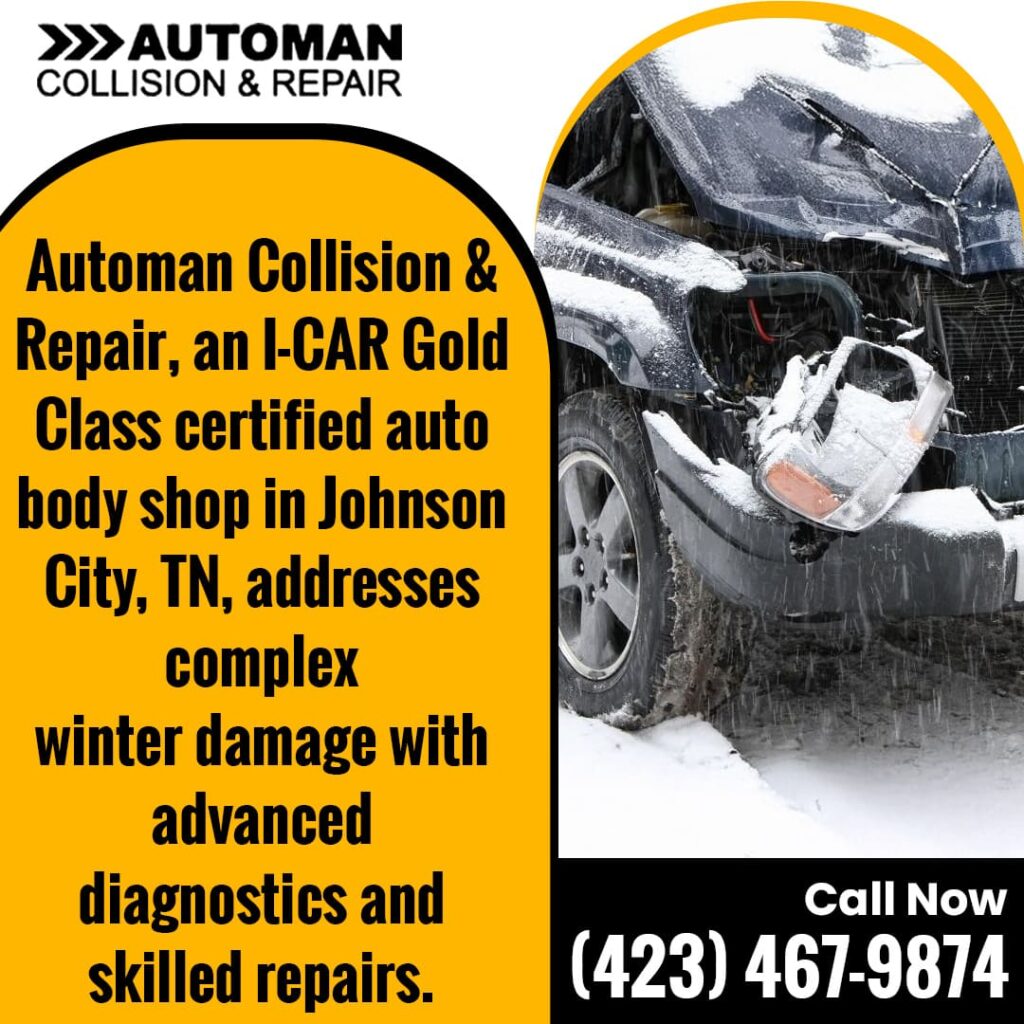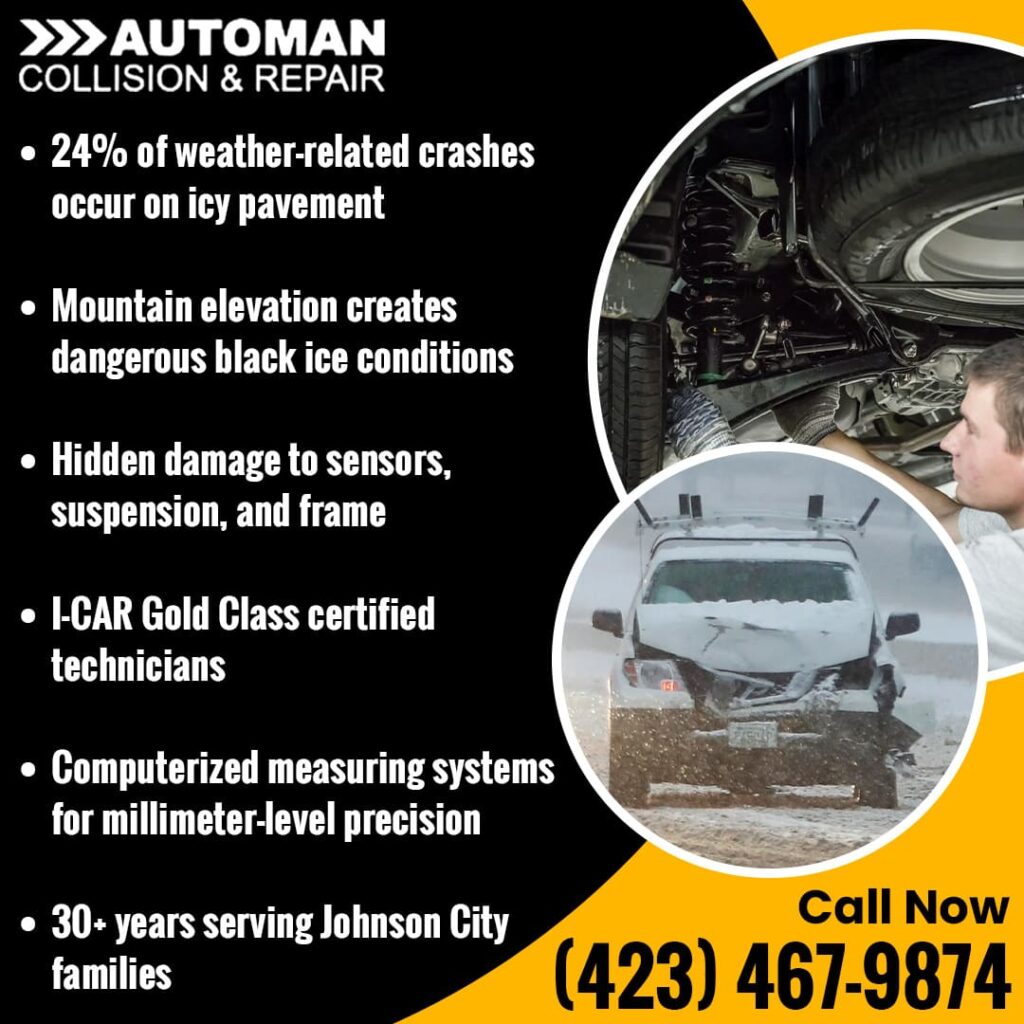Johnson City drivers face higher winter collision risks due to mountainous terrain, elevation changes, and unpredictable weather patterns. The city sits in the southern Appalachian Mountains at varying elevations, creating conditions where temperatures fluctuate rapidly and ice forms without warning. Each year, 24 percent of weather-related vehicle crashes occur on snowy, slushy, or icy pavement, with these conditions appearing frequently on Johnson City’s steep, winding roads.
Automan Collision & Repair LLC, the trusted auto body shop in Johnson City, understands how local geography and winter weather combine to create challenging driving conditions. Our I-CAR Gold-Class certified technicians repair collision damage that results from these unique environmental factors.

Key Takeaways
- Mountain Terrain Creates Unique Hazards: Johnson City, located in the Appalachian Mountains, has elevations that range from downtown to Buffalo Mountain. This creates microclimates where ice can form at higher elevations, while lower areas may remain clear. As a result, drivers must encounter multiple types of precipitation during their commutes.
- Winter Collisions Cause Hidden Damage: Low-speed winter conditions can harm sensors, cameras, and safety systems in front bumpers. Additionally, salt can penetrate damaged paint and accelerate corrosion, making it vital to get an immediate inspection at an auto body shop in Johnson City, TN, to prevent further issues.
- Temperature Fluctuations Increase Black Ice Risk: During the day, roads warm up and refreeze after sunset, creating invisible black ice on bridges and north-facing slopes that stay frozen all day. This makes winter weather-related crashes a significant concern on mountain roads.
- Professional Repairs Require Controlled Environments: Winter auto body repair in Johnson City, TN, requires climate-controlled facilities for proper paint application and curing. Additionally, advanced diagnostic equipment is necessary to identify frame misalignment and structural damage that may not be visible during a visual inspection.
- I-CAR Certification Protects Modern Vehicle Systems: Certified auto body technicians in Johnson City adhere to manufacturer protocols for sensor calibration and structural repairs, confirming that vehicles restore their original crash-test performance. Additionally, local auto body repair specialists are skilled in addressing damage patterns that are unique to steep mountain roads and elevation changes.
Why Do Winter Accidents Increase in Johnson City?
Johnson City’s location in the Appalachian Mountains creates temperature variations that produce black ice, sudden snow accumulation, and hazardous driving surfaces. Buffalo Mountain rises over 2,700 feet within city limits, while surrounding roads climb and descend through elevation changes that create microclimates. One neighborhood experiences clear pavement while another deals with ice-covered surfaces.
Temperature drops occur rapidly after sunset in mountainous areas. Roads warm during daylight hours, melting accumulated snow. This moisture refreezes after dark, creating black ice that remains invisible to drivers. Bridges and overpasses freeze before other road surfaces because cold air surrounds them from above and below.
Tennessee experienced 178,154 car accidents in 2023, with rural mountainous areas seeing increased collision rates during the winter months. Johnson City’s combination of urban traffic volume and mountain geography places it at heightened risk compared to flatter Tennessee regions.
What Makes Johnson City Roads More Dangerous in Winter?
Steep grades, sharp curves, and limited sight distances on mountain roads reduce reaction time when winter weather strikes. State Route 67 climbs through Johnson City with grades that challenge vehicles in optimal conditions. Add ice or snow, and these inclines become treacherous.
The Appalachian region receives moderate snowfall that catches residents unprepared. Northern states with consistent heavy snow maintain better winter driving habits and infrastructure. Johnson City sees enough winter precipitation to create problems, but not enough for drivers to develop expertise in handling severe conditions.
Road design compounds weather challenges. Many Johnson City roads follow historical paths that wind through valleys and over ridges. Modern vehicles travel these routes at speeds unsuitable for sudden weather changes. Curves reduce visibility, preventing drivers from seeing ice patches or stopped vehicles until too late.
Monthly Winter Accident Risk in East Tennessee
| Month | Temperature Range | Primary Hazard | Collision Risk Level |
| November | 35–55°F | Rain to ice transition | Moderate to High |
| December | 28–48°F | Black ice formation | High |
| January | 25–45°F | Snow accumulation | Very High |
| February | 28–50°F | Freeze–thaw cycles | High |
| March | 35–58°F | Unpredictable conditions | Moderate |
How Does Elevation Affect Winter Driving Conditions?
Every 1,000 feet of elevation gain drops the temperature approximately 3.5 degrees Fahrenheit, creating ice at higher elevations while lower areas remain clear. Johnson City spans multiple elevation zones. Downtown sits near 1,600 feet, while residential areas climb toward Buffalo Mountain at 2,700 feet. Drivers encounter changing conditions within minutes.
Moisture behaves differently at various elevations. Rain at lower elevations becomes sleet midway up slopes and transforms into snow at peak elevations. Single commutes involve navigating three precipitation types. This variability makes road treatment difficult for maintenance crews and predictions unreliable for drivers.
Shadow patterns affect road temperatures. North-facing slopes remain frozen throughout winter days because sunlight never reaches the pavement. South-facing roads thaw and refreeze repeatedly. Routes through Johnson City alternate between these exposures, creating inconsistent surface conditions that surprise drivers accustomed to uniform road treatment.
What Types of Winter Damage Require Professional Repair?
Winter collisions typically damage front-end components, undercarriage systems, and structural elements that affect vehicle safety. Low-speed impacts on ice cause more damage than drivers expect. Modern vehicles contain sensors, cameras, and safety systems throughout front bumpers and grilles. Even minor collisions compromise these technologies.
Hitting curbs can twist body panels and misalign the structural mounts that support suspension alignment. Contact between the frame and road edges often causes hidden cracks or weld stress that need precise measurement to detect. Salt and chemicals used for road treatment can seep into chipped paint, accelerating corrosion beneath the surface. What begins as minor cosmetic damage can rapidly develop into significant rust and deterioration of the panels.
Common winter collision damage includes:
- Front bumper and grille deformation from icy road impacts often results in misaligned panels and cracked plastics.
- Fender and quarter panel dents occur when vehicles slide on narrow, sloped roads.
- Paint damage and surface abrasions expose metal to moisture and salt, promoting corrosion over time.
- Side impacts and parking lot slides frequently cause door creases and misaligned gaps between panels.
- Undercarriage scrapes from slipping off road edges can bend mounting points or scuff protective coatings.
- Modern safety systems located behind bumpers and panels, such as sensors and cameras, can also be dislodged or disabled by even minor collisions.
When Should You Seek Auto Body Repair After Winter Damage?
Schedule a professional inspection immediately after any winter collision, regardless of visible damage severity. Delayed repairs allow problems to escalate. Cracked bumpers expose wiring to moisture. Misaligned panels create gaps where water enters the vehicle interior. Small dents collect salt that rusts through sheet metal.
Insurance claims require prompt reporting. Most policies specify timeframe requirements for accident notification. Waiting weeks before filing claims raises questions about when the damage occurred. Document collision details, weather conditions, and road circumstances immediately.
Hidden damage assessment requires specialized equipment. Auto body repair in Johnson City, TN, includes diagnostic scanning that identifies problems invisible to untrained observation. Certified auto body technicians in Johnson City understand how impact forces transfer through modern vehicle structures, compromising safety even when exterior damage appears minor.
Temperature affects repair quality. Winter repairs require controlled environment conditions. Paint application and curing demand specific temperature and humidity levels. Automan Collision & Repair, the local auto body shop in Johnson City, TN, maintains modern facilities that produce factory-quality finishes regardless of outdoor weather.
Why Choose I-CAR Gold-Class Certified Technicians?
I-CAR Gold-Class certification demonstrates ongoing training in current vehicle technology, repair procedures, and safety system calibration. Modern vehicles contain computer networks controlling everything from engine performance to collision avoidance. Winter accident repairs affect these systems. Improper repairs compromise protection during subsequent collisions.
Sensor calibration requires manufacturer-specific procedures and equipment. Forward collision warning cameras mount behind windshields. Replacing damaged windshields without proper calibration leaves safety systems non-functional. Radar sensors behind front bumpers need precise alignment. Incorrect positioning produces false warnings or fails to detect obstacles.
Our certified auto body technicians in Johnson City follow manufacturer repair protocols. Structural damage repairs restore factory crash-test performance. Welding techniques maintain metal strength specifications. Adhesive applications bond panels correctly. Parts selection matches original equipment quality.
Advanced equipment identifies damage missed by visual inspection. Frame measuring systems detect misalignment within millimeters. Diagnostic scanners read fault codes from control modules. Paint matching technology reproduces factory colors exactly. These tools require training and certification to operate effectively.

Trust Local Auto Body Repair Experience
Winter driving conditions in Johnson City demand specialized collision repair knowledge. At Automan Collision & Repair LLC, three decades of serving the area have taught us how mountain weather affects vehicles. We understand damage patterns unique to steep roads and elevation changes. Every repair considers factors specific to our region.
Call (423) 467-9874 or email [email protected] for a free estimate on your winter collision damage. Our auto body shop in Johnson City, TN, works with all insurance companies and handles claim paperwork. Our I-CAR Gold-Class certified technicians use advanced diagnostic equipment to identify hidden damage that other shops miss.
Reader’s Choice Award recognition and over 30 years of experience demonstrate our commitment to quality repairs. We serve Johnson City, Jonesborough, Elizabethton, and nearby areas across East Tennessee. Your vehicle deserves repair by technicians who understand local collision challenges and modern vehicle technology.
Don’t let winter damage compromise your vehicle’s safety and value. Schedule your inspection today and experience the difference that Gold-Class certification and local knowledge provide. We won’t consider repairs complete until you’re satisfied with the results.
